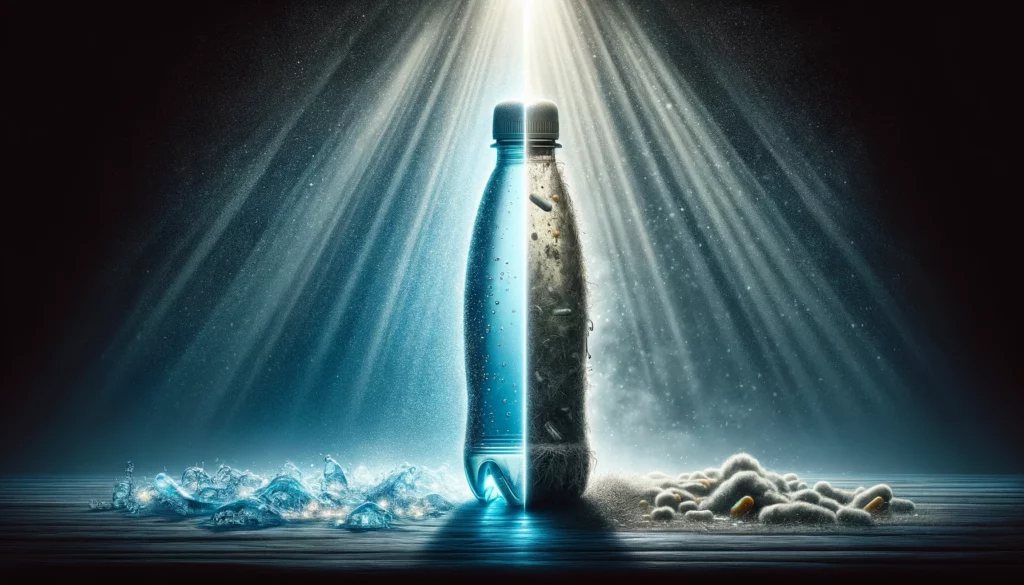
A new study reveals that your average reusable water bottle may contain about 40,000 times more germs than a toilet seat (in some instances). In fact, your pet’s drinking bowl is 14 times cleaner than your everyday water bottle if the latter is not washed regularly. However, more bacteria doesn’t always mean bad news. In this case, most of the bacteria comes from your own mouth — and it’s not really harmful.
In November 2022, a team of water quality experts from Denver-based WaterFilterGuru collected germ-swab samples from the surfaces of numerous used water bottles of different designs that are popular in the US. Each surface was swabbed three times, including the lids, and all these samples were tested in a lab. The results of the test were recently published.
“We discovered that the average bacteria CFU (Colony-Forming Units) count in reusable water bottles reached 20.8 million underscoring the critical need for rigorous hygiene practices. This finding, almost consistent across various bottle types tested, signals that no matter the design or lid type of the bottle, maintaining cleanliness is essential for everyone’s health.” Brian Campbell, a Certified Water Specialist and founder of WaterFilterGuru told ZME Science.
What makes reusable water bottles so dirty?

According to the study, about 15% of Americans don’t clean their reusable water bottles regularly. Surprisingly, individuals in the GenZ age group were found to be most reluctant to clean their bottles, with about 16% washing theirs only a few times a month.
All such uncleaned bottles become a suitable breeding chamber for a large number of germs. Moreover, every time a person drinks water from such a bottle, the bacteria from their mouth also further contaminate the bottle.
“The human mouth is home to a large number and range of different bacteria. So it’s not surprising that drinking vessels are covered in microbes.” Dr. Andrew Edwards, a microbiologist at Imperial College London who was not involved in the study, told News.com.au.
But when researchers looked at the type of bacteria that’s on the water bottles, a large number of bacteria were found to come from our own mouths, so they are not harmful to your health.
But this doesn’t mean all the bacteria was okay.
The researchers also detected the presence of bacillus and gram-negative rods, two disease-causing bacteria that are associated with stomach (and intestinal) problems and antibiotic resistance respectively.
Therefore, “The same vessel that brings healthy hydration to your daily routine could make you sick if not cared for properly. If you’ve been feeling unwell, check in with your water bottle cleaning habits to see if bacteria and mold might be the culprit,” the study authors note.
The study also revealed that among different types, bottles with spout-top and screw-top lids harbored the highest number of bacteria, while, those with squeeze-top lids carried the least.
We shouldn’t stop using reusable bottles. Just wash them more
In their study, the researchers didn’t take into account the reusable water bottles that are washed and cleaned daily. These findings are based on the water bottle cleaning habits of 1,000 Americans, and how those habits affect the CFU count in their bottles.
“Unfortunately, we cannot speak of bottles that are washed daily and cleaned, for we did not include those in our swab sample,” Campbell said.
He further suggests that using reusable water bottles is generally safe if you maintain proper hygiene.
When we asked him about some simple precautions one can take to keep their water bottles free of harmful germs, Campbell replied:
- Regularly clean your water bottle, ideally daily, using soap and hot water.
- Dry the bottle thoroughly after washing to prevent bacterial growth.
- Avoid sharing your bottle with others to reduce the risk of spreading germs.
- Choose bottles that are easy to clean, with fewer hard-to-reach spots.
The study authors also recommend sanitizing your water bottle once a week, more often if you also happen to be drinking liquids other than water from your bottle.
“These simple and easy-to-follow habits can significantly reduce germ counts, making reusable bottles a safe, environmentally friendly choice,” Campbell told ZME Science.
You can further read the results of the study here.


